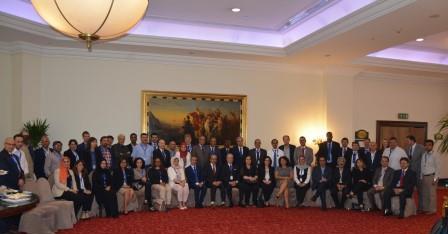Developing a universal health coverage priority benefit package for Member States of the Eastern Mediterranean Region
3-day meeting marks important steps to enhance access to needed health services and ensure financial protection for all in the countries of the Eastern Mediterranean Region

2 October 2017 – Every year in the WHO Eastern Mediterranean Region, an estimated number of 16.5 million people face financial hardship after paying for health care out of their own pocket; and as many as 7.5 million people are pushed into poverty due to these costs. In some countries of the Region, out-of-pocket payments for health services make up over 70% of total national spending on health. This perpetuates inequality and poverty, and prevents people from accessing the services they need.
To tackle this issue, universal health coverage emerged as a key global health policy goal. It is defined as all people and communities receive the quality health services they need, without financial hardship. It is one of the targets of the Sustainable Development Goal 3, to be reached by 2030; and is endorsed at global, regional and national levels.
An important step toward ensuring access to health care for all is to explicitly define which programmes, services and interventions should be provided and financially covered for the population. This Priority Benefit Package does not only cover treatment but also services which help prevent poor health and promote well-being for individuals and communities alike. It also includes policies in other sectors related to health. Furthermore, it should not only cover national citizens, but also refugees or non-nationals, such as labour migrants.
While all Member States in the Region have some form of benefit package, implementation is patchy. Some of the challenges contributing to poor coverage of the population include improper health system infrastructure, absence of an integrated approach, shortage of staff, weak referral system and feedback mechanism, lack of private sector engagement, limited financial support, poor client satisfaction and community perception of public facilities.
In order to support Member States in their efforts towards universal health coverage, the WHO Regional Office for the Eastern Mediterranean arranged a 3-day meeting, 26–28 September, bringing together 23 globally renowned experts and 26 senior and mid-level policy-makers and health practitioners from 18 Member States. The meeting aimed to developing a universal health coverage priority benefit package for Member States of the Eastern Mediterranean.
During the meeting, experts from other regions, such as Latin America and Southeast Asia, shared their experiences from defining and implementing Priority Benefit Packages, and representatives from Member States from the Region presented the current situation in their respective countries. Given the humanitarian emergencies in the Region, due focus was given to the challenges of ensuring access to health care, especially for refugees, during times of armed conflict and natural disasters.
Participants of the meeting noted the acute need for increased investment in health, in order to ensure access for all. “We need to frame the discussion around what is needed to provide universal health coverage for all people in our Region, not merely what is possible given the current resources,” says Director of Health System Development at the WHO Regional Office, Dr Zafar Mirza. Adding that “defining a priority benefit package is an important tool to empower people to hold decision-makers accountable. What we need now is strong political commitment, leadership and good governance”.
Key messages which emerged from the meeting included the need to mobilize political commitment and support for universal health coverage in the Region through high-level policy dialogue, and the need for equity as a fundamental, driving value, as well as the importance of including financial coverage aspects and funding schemes within these discussions. It was noted that establishing a national priority benefit package, and advancing towards increased financial protection and universal health coverage is a continuous and stepwise process, and not a one-off effort, which includes taking the numerous implementation challenges into account.
It was also noted that in fragile states and countries facing humanitarian emergencies, defining a priority benefit package can be an important step in bridging emergency relief efforts and long-term development strategies. Finally, given the prominence of the private sector, which provides up to 70% of outpatient health services in the region, it is imperative that there is increased engagement with the private sector for universal health coverage.
This 3-day meeting was part of a longer, consultative process which started in 2015. It will result in a publication harnessing insights and lesson learned. A regional universal health coverage priority benefit package will be finalized, along with guidance for Member States on how to increase access to health care services and financial protection taking the specific national context into account.
“This meeting reaffirms universal health coverage, which includes people affected by emergencies, refugees and migrants, as a number one priority for the Region,” says WHO Regional Director Dr Mahmoud Fikri. |